2020 GFAS Carole Noon Award and
NEW Outstanding Sanctuary Awards – Nominations Now Open!
The GFAS Carole Noon Award is given annually to an individual who embodies and puts into practice the GFAS philosophy of vision, dedication, and excellence in animal care at sanctuaries. The award was created in 2009 to honor outstanding contributions to the animal sanctuary field to memorialize Carole Noon, Ph.D., a courageous and innovative sanctuary pioneer and champion of chimpanzees.
New, in 2020, the GFAS Award Committee and Board of Directors will present the First Annual Outstanding Sanctuary Awards to recognize excellence in humane and responsible animal care; professionalism and ethics; organizational sustainability; public engagement; and contributions to, and leadership within, the sanctuary field. GFAS Accredited/Verified sanctuaries, transition, rescue, and rehabilitation centers will be honored in four categories:
- Outstanding Equine Sanctuary of 2020
- Outstanding Farmed Animal Sanctuary of 2020
- Outstanding Wildlife Sanctuary of 2020
- Outstanding International Sanctuary of 2020
Nominations for all awards open on August 15, 2020. The deadline for submissions is September 3, 2020. All award recipients are honored publicly, receive an engraved plaque, are offered an honorarium for their organization, and are offered membership to the GFAS Award Committee.
For full nomination requirements, evaluation criteria, nomination and reference forms, please see the GFAS website.
Coming Together in the Time of COVID-19
by Christina Keim, The Chronicle of the Horse
“What I see in the state of Virginia is that we’re working as a team, trying to come up with solutions and ideas to keep moving forward,” said Jo Anne Miller, executive director and founder of GFAS Accredited Brook Hill Farm, during her interview for an article published in the July issue of The Chronicle of the Horse and written by author Christina Keim. View the article here.
Learn how our equine welfare organizations and partners are mobilizing support by compiling resources, fielding requests, and developing safety programs during these uncertain times. This article includes insights from: Lynn Coakley, president of EQUUS Foundation; Ashley Harkins, director of the United Horse Coalition; Kathy Lang, founder of Becky’s Gift Equine Relief; Emily Stearns, program manager of UHC’s Equine Welfare Data Collective; Christy Landwehr, CEO of Certified Horsemanship Association; Carrie Hull, executive director of Maryland Horse Council; and, Jo Anne Miller, executive director of Brook Hill Farm.
International Tiger Day Photo Contest Winners!
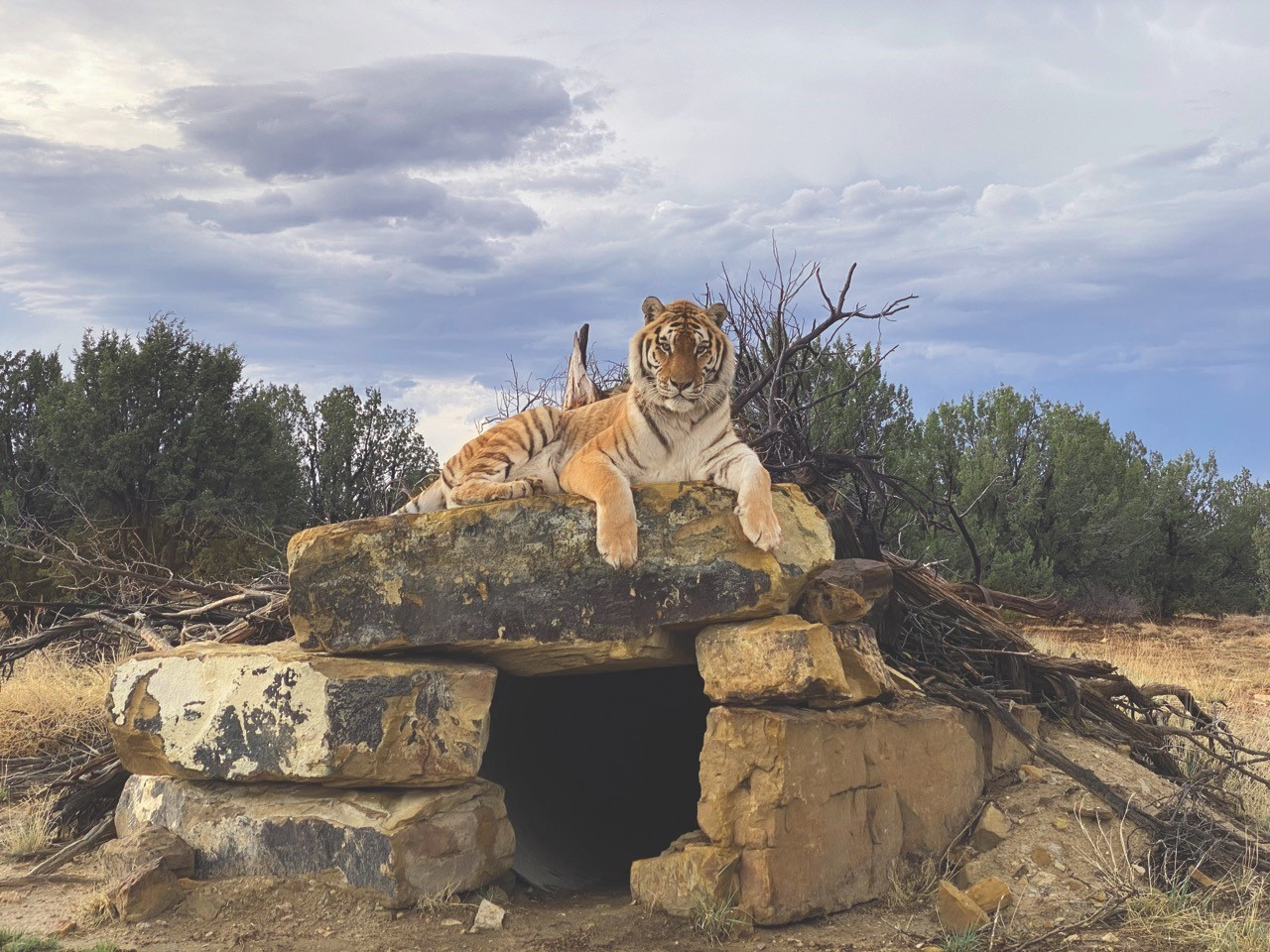
Tigers in America and the Global Federation of Animal Sanctuaries were pleased to announce the winners of the photo contest on International Tiger Day, July 29, 2020.
The photo submissions, which highlighted the plight of tigers living in captivity in the United States and promoted rescue of tigers to true sanctuaries, were uniformly excellent! As you can imagine, this presented many challenges to the contest judges, resulting in 14 finalists, in addition to the overall winner, plus two special award categories.
The overall winner, pictured here, titled “Almost Wild” depicts Bailey the Tiger sitting on his den at The Wild Animal Refuge in Colorado, a GFAS Accredited sanctuary. Bailey was rescued from a failed facility in South Dakota in the fall of 2016. He is about 13 years old, and his enclosure-which he shares with two other cats-is 35 acres. Congratulations to entrants Taylor Jordan and Pat Craig.
See photos from all finalists on our GFAS Facebook page, at https://www.facebook.com/pg/GFASsanctuary/photos/?tab=album&album_id=10158183844741708
Equine Welfare Data Collective – Second Report Has Arrived
Analysis of Data Reported for: July 2018 to December 2018
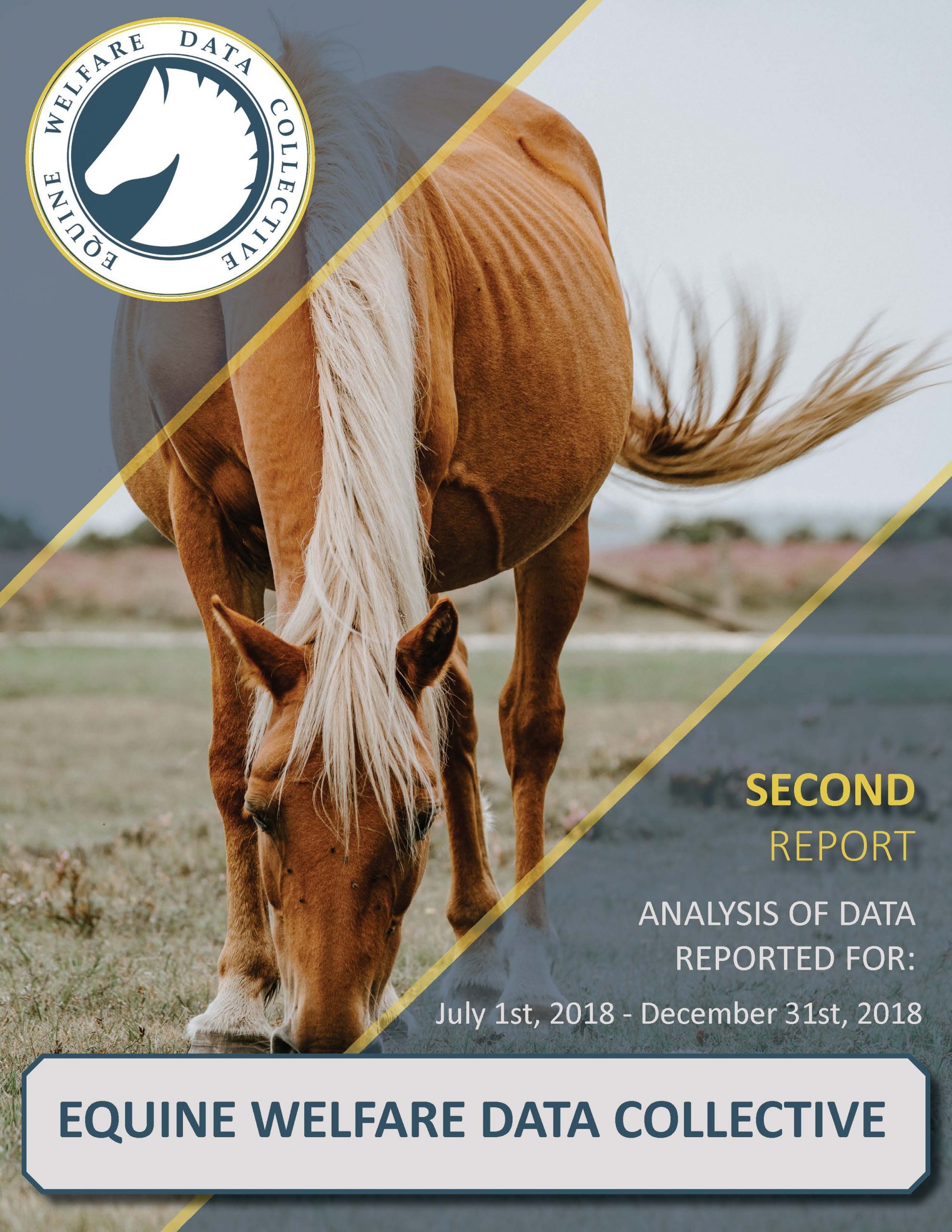
The Equine Welfare Data Collective (EWDC) has officially released their second report and it is packed with valuable information. We have provided a link to the document on our GFAS website, but you can also view this report alongside the inaugural report at: https://unitedhorsecoalition.org/ewdc/#ewdc-reports
While anecdotal opinions and stories have their place, this report contains a detailed analysis of data submitted by equine welfare organizations from July 2018 to December 2018. This second report is a continuation of our long-term commitment and collaboration to assist with the collection, analysis, and reporting of data on at-risk equines across the United States. We thank all of you that participated and hope you and many more will continue to support this effort.
Some interesting facts to note. In, 2018, just under 1,000 nonprofit 501(c)(3) animal welfare organizations took in at-risk equines and those in transition across the United States. Of the respondents to the data collective survey, 51.4% were adoption/rescue/transition centers while approximately 46% provided sanctuary/retirement or a combination of adoption/sanctuary programs.
Nationally, 75% of respondents did not microchip equines and the size, type, or record keeping systems of the organizations were NOT found to be associated with the practice of microchipping. Microsoft Excel is a popular record keeping system for equine welfare organizations (33.55), but 37.4% still use paper records rather than one of the many online systems.
This excellent report has much more information to share, so please take the time to have a look and dig in.
Sound the Trumpets for Global Sanctuary for Elephants!
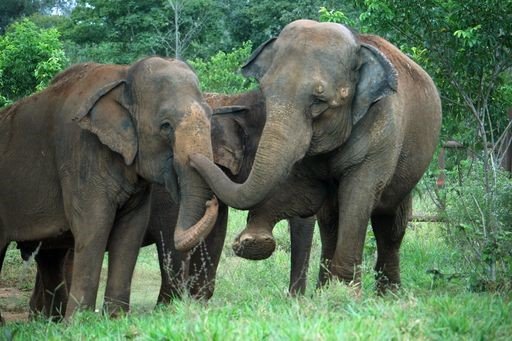
It’s a new day in captive elephant care in South America and recently Accredited, Global Sanctuary for Elephants (GSE) is leading the way. GSE’s first project, Elephant Sanctuary Brazil, is located in Chapada dos Guimarães, on 2,800 lush acres of grasses, fruit trees, small rivers, ponds and streams. The tropical climate is ideal for elephants, and four rescued Asian female elephants are currently thriving in it: Maia, Rana, Lady and Mara.
GSE founders, Scott and Kat Blais, were introduced to the urgency for sanctuary development in South America by Petter Granli and Dr. Joyce Poole of ElephantVoices. For several years prior, ElephantVoices had worked with a volunteer group in Brazil to advance protective legislation. With a growing number of elephants displaced by local bans on performing animals, a sanctuary was necessary to guarantee the care they need within an appropriate expansive habitat.
South America is in the midst of a cultural shift in how people view captive animals. Several countries including: Bolivia, Colombia, Paraguay and Peru have banned performing animals and Brazil is on track to follow. Across the continent, zoos are re-considering their role and making plans to send their elephants to sanctuary. The world has taken notice, as the New York Times recently featured Mara’s 1,700 mile road journey from an Argentinian zoo to Elephant Sanctuary Brazil. Mara’s liberation is emblematic of the experience shared by her new companions. A long overdue departure from a lifetime of subservience and isolation into the un-bound paradise of a true sanctuary.
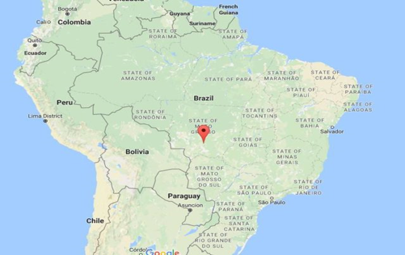 Global Sanctuary for Elephants continues to win the hearts and minds of those in the zoo community as the director of Ecoparque Mendoza in Argentina recently committed to sending all four of their elephants to Elephant Sanctuary Brazil. Scott and Kat’s philosophy is simple as it constitutes a return to an elephant’s birthright, “the vast, natural, safe space of their sanctuary empowers elephants to think, move, and communicate once again, all with the incomparable support of other herd members. Their journeys are not only emotional to follow, but they serve to educate about the depth of trauma that is caused by the sterile life of captivity, the resilience each individual has, and their desire to become whole again. Our goal at GSE is to give elephants back their lives.”
Global Sanctuary for Elephants continues to win the hearts and minds of those in the zoo community as the director of Ecoparque Mendoza in Argentina recently committed to sending all four of their elephants to Elephant Sanctuary Brazil. Scott and Kat’s philosophy is simple as it constitutes a return to an elephant’s birthright, “the vast, natural, safe space of their sanctuary empowers elephants to think, move, and communicate once again, all with the incomparable support of other herd members. Their journeys are not only emotional to follow, but they serve to educate about the depth of trauma that is caused by the sterile life of captivity, the resilience each individual has, and their desire to become whole again. Our goal at GSE is to give elephants back their lives.”
Learn more about GSE and Elephant Sanctuary Brazil here: www.globalelephants.org.
Juliana’s Animal Sanctuary, Chia, Colombia, South America
Recently, GFAS proudly announced the Verification of Juliana’s Animal Sanctuary, the first farmed animal sanctuary to be certified in South America. Founder, Juliana Castaneda Turner, had a love for all animals since she was a little girl growing up in Colombia. Having property to provide a safe haven for animals, was a dream Juliana held on to for as long as she can remember.
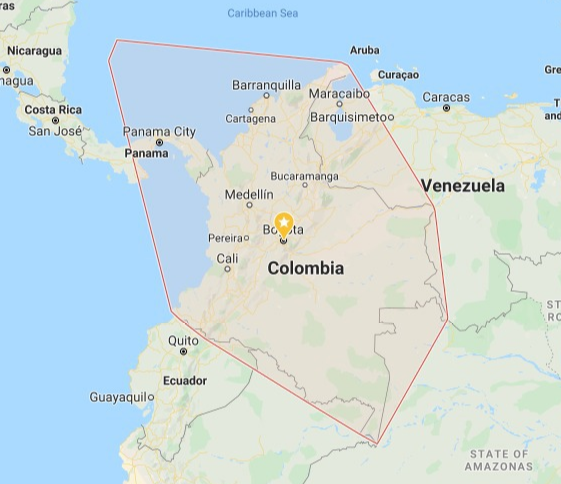
Establishing an animal “sanctuary”, and particularly a “farm animal sanctuary”, is not without significant challenges in Colombia. Colombia is a beautiful country with rainforests, the Andes mountains, and numerous coffee plantations but 34 percent of the population live below the poverty line. The country’s poverty, unemployment, and social problems such as drug cartels and guerrilla warfare, mean that the well being of farm animals is given little regard. Though there are some animal welfare laws in place, they are rarely followed and enforced. The US government often releases travel warnings to this country so like-minded visitors from other countries are infrequent.
These challenges have not deterred Juliana. Since Juliana’s Animal Sanctuary was officially established in 2007, she and her team have rescued more than 700 animals of all kinds. A few years ago, she realized that she could not save them all but that she could set an example of good animal welfare as well as educating the public. Today, their highly regarded educational programs include vegan cooking workshops, vegan comics, vegan food relief and strong social media advocacy.
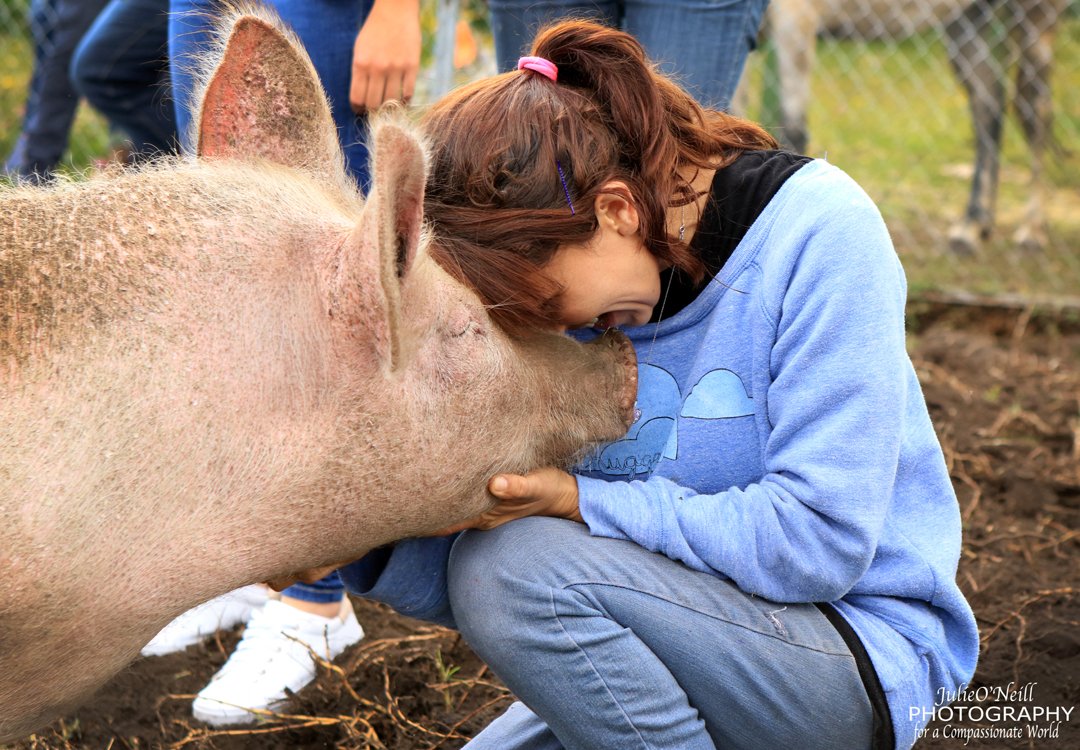 Juliana’s husband, Paul Turner, has been instrumental in drawing international attention to the situation of animals in South America. Paul is the International Director of Food For Life Global (www.ffl.org). International attention has also come from Daniel Turbert, an award-winning photographer and filmmaker (When the Cows Come Home) and founder of the Sentient Project. Daniel has worked with many animal sanctuaries around the world using photography to help raise awareness and fundraising efforts.
Juliana’s husband, Paul Turner, has been instrumental in drawing international attention to the situation of animals in South America. Paul is the International Director of Food For Life Global (www.ffl.org). International attention has also come from Daniel Turbert, an award-winning photographer and filmmaker (When the Cows Come Home) and founder of the Sentient Project. Daniel has worked with many animal sanctuaries around the world using photography to help raise awareness and fundraising efforts.
Juliana and her team provide the highest quality of care to numerous animals as well as being committed to changing animal welfare practices and how people view farmed animals in Colombia. In her words, “I will continue to teach respect for all beings, to all the human hearts I encounter.”
For more information about Juliana’s Animal Sanctuary, please visit, https://julianasanimalsanctuary.org/.
GFAS Certifications and Renewals
Over the past month, we have certified four new organizations and re-certified two organizations. Congratulations to all these groups!
New Certifications
Equine Welfare Network, Florida
Global Sanctuary for Elephants, Brazil
Juliana’s Animal Sanctuary, Colombia
River’s Wish Animal Sanctuary, Washington
Renewals
Equamore Foundation, Oregon
Horse Feathers Equine Center, Oklahoma
